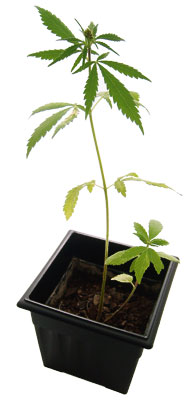Many of the compounds in cannabis have medicinal properties. Hélène
Perrotin-Brunel developed a technique to extract these chemicals in their purest forms.
Apart from adverse side-effects like schizophrenia-like symptoms, cannabis can also help relieve pain, reduce convulsions and nausea, sooth inflammation and lessen feelings of anxiety. That the plant’s active compounds – the cannabinoïds – have many medicinal properties is well known. Yet according to Hélène Perrotin-Brunel many of the chemicals present in low quantities in the plant are not available on the market in quantities necessary for developing new medicines. “So far, for large-scale production, there are no economically and technically viable methods to extract those chemicals,” she says.
Perrotin-Brunel worked on a technique that she hopes will one day make sufficient amounts of cannabinoïds available. Next month the PhD researcher at the department of Process and Energy (faculty 3mE) will defend her thesis, titled ‘Sustainable production of cannabinoïds with supercritical carbon dioxide technologies’. Supercritical carbon dioxide is a solvent with which the Process and Energy researchers experiment a lot. When under relatively high pressure and heated, the carbon dioxide obtains properties that are an intermediate state between liquid and gas. By varying the temperature and pressure, one can vary which fractions of the compounds dissolve in it.
“One of the nice things about this technique is that when you drop the pressure the carbon dioxide evaporates immediately, so you don’t have any solvent left in the fraction, as you do have with the other methods being used at the moment,” says Perrotin-Brunel, adding that as far as she knows she is the second academic in the Netherlands to work on a technique for extracting cannabinoïds. She believes some work on this topic is being done in the United States, but also there the research is conducted in a small circle: “Pharmaceutical companies are probably doing research as well, but they do not publish about it.”
“It is hard to find funding to develop extraction techniques,” Perrotin-Brunel continues. “You first need to show what the exact effects of the cannabinoïds are. But for the medical studies you need sufficient amounts of the chemicals in the first place. So it’s the problem of the serpent biting its own tail.”
De studenten protesteerden bij het PvdA-congres tegen plannen voor afschaffing van de basisbeurs. Cohen stelde ze gerust. In het leenstelsel dat hij voor ogen heeft, hoeven studenten pas terug te betalen als hun inkomen dat toelaat. Bij AKKU gingen ze ervan uit dat afgestudeerden met een laag inkomen alleen uitstel van betaling kregen, en door de langere afbetaaltermijn en oplopende rente uiteindelijk zelfs duurder uit zouden zijn.
“Een positief gesprek over onze bezwaren”, zegt AKKU-voorzitter Jonas Sweep. Of daarmee voor de studenten een uitgebreider sociaal leenstelsel als vervanging voor de basisbeurs bespreekbaar is geworden? “In principe zijn we nog steeds tegen.”
Cohen zei zijn plannen voor een nieuwe studiefinanciering waarbij meer geleend wordt prima te kunnen verdedigen. Hij wil dat doen met een toer langs alle universiteitssteden. En wellicht ook tijdens een aangekondigde studentendemonstratie op 21 mei op het Museumplein in Amsterdam.



Comments are closed.